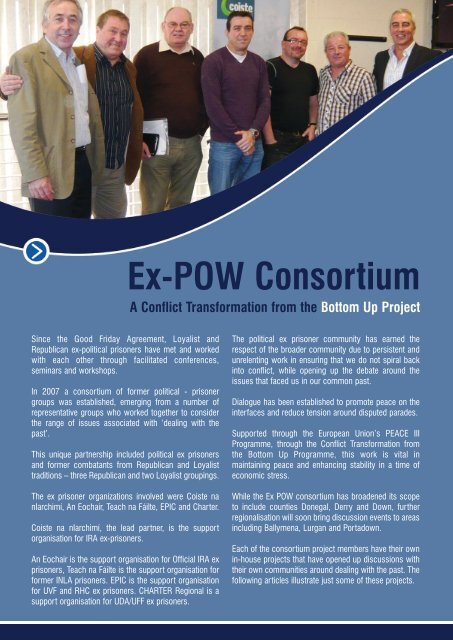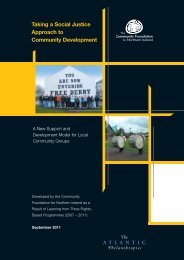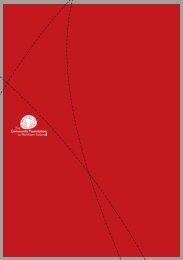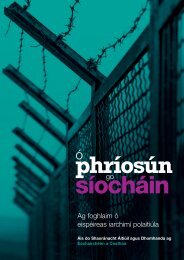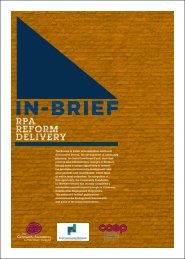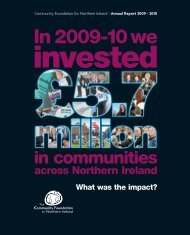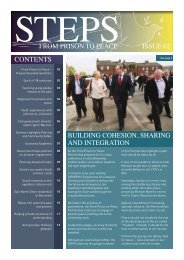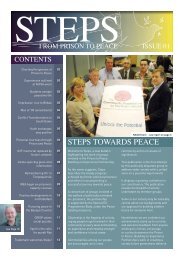Ex-POW Consortium - Community Foundation for Northern Ireland
Ex-POW Consortium - Community Foundation for Northern Ireland
Ex-POW Consortium - Community Foundation for Northern Ireland
You also want an ePaper? Increase the reach of your titles
YUMPU automatically turns print PDFs into web optimized ePapers that Google loves.
<strong>Ex</strong>-<strong>POW</strong> <strong>Consortium</strong>A Conflict Trans<strong>for</strong>mation from the Bottom Up ProjectSince the Good Friday Agreement, Loyalist andRepublican ex-political prisoners have met and workedwith each other through facilitated conferences,seminars and workshops.In 2007 a consortium of <strong>for</strong>mer political - prisonergroups was established, emerging from a number ofrepresentative groups who worked together to considerthe range of issues associated with ‘dealing with thepast’.This unique partnership included political ex prisonersand <strong>for</strong>mer combatants from Republican and Loyalisttraditions – three Republican and two Loyalist groupings.The ex prisoner organizations involved were Coiste nanIarchimí, An Eochair, Teach na Fáilte, EPIC and Charter.Coiste na nIarchimí, the lead partner, is the supportorganisation <strong>for</strong> IRA ex-prisoners.An Eochair is the support organisation <strong>for</strong> Official IRA exprisoners, Teach na Fáilte is the support organisation <strong>for</strong><strong>for</strong>mer INLA prisoners. EPIC is the support organisation<strong>for</strong> UVF and RHC ex prisoners. CHARTER Regional is asupport organisation <strong>for</strong> UDA/UFF ex prisoners.The political ex prisoner community has earned therespect of the broader community due to persistent andunrelenting work in ensuring that we do not spiral backinto conflict, while opening up the debate around theissues that faced us in our common past.Dialogue has been established to promote peace on theinterfaces and reduce tension around disputed parades.Supported through the European Union’s PEACE IIIProgramme, through the Conflict Trans<strong>for</strong>mation fromthe Bottom Up Programme, this work is vital inmaintaining peace and enhancing stability in a time ofeconomic stress.While the <strong>Ex</strong> <strong>POW</strong> consortium has broadened its scopeto include counties Donegal, Derry and Down, furtherregionalisation will soon bring discussion events to areasincluding Ballymena, Lurgan and Portadown.Each of the consortium project members have their ownin-house projects that have opened up discussions withtheir own communities around dealing with the past. Thefollowing articles illustrate just some of these projects.
What is the Conflict Trans<strong>for</strong>mationfrom the Bottom Up Programme?Conflict Trans<strong>for</strong>mation from the Bottom Up is an EUfundedprogramme supporting <strong>for</strong>mer political prisoners.It is administered through the <strong>Community</strong> <strong>Foundation</strong> <strong>for</strong><strong>Northern</strong> <strong>Ireland</strong> and includes 12 other partnerorganisations from the republican constituency.Each partner group has its own programme of activitiestailored to the needs of its own locality.In addition, Coiste na n-Iarchimí, the central body of thenetwork, plays a coordinating role across the networkand operates at a strategic level when issues that affectall politically motivated <strong>for</strong>mer prisoners are undernegotiation.The aims of the programme are:• To enhance partnerships already established acrossthe network and between the network and others.• To reach out to those who in the past have beenunwilling to engage in dialogue with the republicanconstituency.• To further develop the capacity of the network andengage with the new political dispensation,governmental institutions and statutory agencies.• To deal with the legacy of the past through buildingtrusting sustainable equal partnerships with all otherinterested parties.What is Truth Recovery?Over 40 participants attended a recent <strong>Consortium</strong>seminar, asking if Truth Recovery heals or prolongs thelegacy of conflict.Kate Turner from Healing through Remembering and TimO’Malley from Consensus Initiative listened intently asLoyalist and Republican ex-political prisoners gave theirviews and opinions on the issue of Truth Recovery and,in particular, a Truth Commission process to cope withthe legacy of our own conflict.The panel discussion provided a range of varying views,with opinions given on the legal necessity <strong>for</strong> such acommission and the timing of its potential operations.Interesting discussions were held around the issue ofstate related violence and other actors in the conflict.The issue of State related violence was raised, as werequestions on the onus on the state and other actors in theconflict including civic society to participate in TruthRecovery.Everyone involved in the seminar felt there was a need tofurther discuss and understand the issues involved in thetruth recovery process, if there is ever to be one.In line with its coordinating role, Coiste na n-Iarchimíoversees the work of a consortium of politicallymotivatedex-prisoner support groups from UDA, UVF,IRA, Official IRA and INLA backgrounds.In line with its coordinating role, Coiste na n-Iarchimípublishes the Coiste magazine to showcase the work ofthe Conflict Trans<strong>for</strong>mation from the Bottom Upprogramme and to offer a medium of discussion anddebate across the Coiste network.2<strong>Ex</strong>-<strong>POW</strong> <strong>Consortium</strong>Conflict Trans<strong>for</strong>mation from the Bottom Up Project
<strong>Ex</strong>-<strong>POW</strong> <strong>Consortium</strong>Conflict Trans<strong>for</strong>mation from the Bottom Up Project3It’s a considerable accomplishment, bearing in mindthat, in the past, violence and mistreatment, were not justdirected against groups from the other ‘community’ butalso within both the Loyalist and Republicancommunities.Added to this is the extra dimension that the discussionshave also included a number of external voices,facilitators or observers.Healing Through RememberingKate Turner from Healing Through Remembering hasworked with political ex-prisoners on a number ofmajor initiatives in the recent past.Here, she provides her own reflections on dialogue todate and the challenges and issues ahead.A number of collective groups exist which create thecircumstances and environment <strong>for</strong> the various exprisonergroups to work together collectively to create abetter future.The work of the Conflict Trans<strong>for</strong>mation from the BottomUp Programme and the <strong>Ex</strong>-<strong>POW</strong> <strong>Consortium</strong> in particularhas been noteworthy in a number of areas, but isparticularly significant in considering the issue of dealingwith the past.This is a difficult issue to consider from any perspectivebut is particularly complex <strong>for</strong> ex-prisoner organisations.The fact that these initiatives address these issues ischallenging enough - that participants have managed tohold collective events examining these issues in athoughtful and honest way is a significant achievement.A variety of views have been aired in open debate andthen discussed in a civilised and thoughtful manner.Ongoing challenges are provided through thecontinuation of these debates, including the sharing offurther internal considerations of each group and leadingon from these more collective exchanges - it may eveninclude the potential to examine some of the intracommunityissues within the community groupings.Finally, there is the challenge of engaging more externalparties, with the aim of bringing them into discussionsand sharing learning and conclusions from debates withwider society.Potential also exists <strong>for</strong> debates to enable those notcurrently addressing these issues to begin to considerhow we all deal with the past, to create a more peacefulfuture.None of these will be easy <strong>for</strong> the political ex-prisonersinvolved, their constituent groups or other individuals.However, these issues can be tackled with the respectand sincerity, which has characterised work to-date, thenit will be to the benefit not only of those groups involved,but also wider society.Discussions have been wide-ranging while remainingreasoned and genuine.
Counselling deals with legaciesof the pastFra Halligan is a Development Officer <strong>for</strong> the <strong>Ex</strong>-<strong>POW</strong><strong>Consortium</strong>, based with Teach Na Failte. Fra is aqualified counsellor with training in mental healthsupport and personal development.Here, he outlines his key activities and stresses theimportance of a sound approach to dealing with issuesof the past.I am a member of the British Association <strong>for</strong> Counsellingand Psychotherapy and allied to a wide range of activitiesconnected with the Conflict Trans<strong>for</strong>mation from theBottom Up Project in my role as a Development Officer. Ialso provide a counselling service <strong>for</strong> <strong>for</strong>mer RepublicanSocialist Political Prisoners and their families.This service was established after in-depth researchshowed a clear and defined need - no services existed <strong>for</strong>INLA/IRSP ex-prisoners until Teach Na Failte was <strong>for</strong>med.The level of need was great and there was nowhere <strong>for</strong>this body of people to go and no one to turn to <strong>for</strong> help,compounding feelings of exclusion and low self esteem.Agencies and bodies which did exist were often viewedwith suspicion and avoided.Over the last few years, this in-house service has been ingreat demand and has proved so effective more trainedcounselors and staff are required to cope with theincreasing work load.There is much work still left to do - the whole area oftrauma is still there to be explored and faced and thecounselling service is a small but vital part of the overallwork of Teach Na Failte and the Conflict Trans<strong>for</strong>mationfrom the Bottom Up Project.A range of complimentary services have been developedto operate alongside the main counseling service,including outreach visits, befriending and listeningsessions and monthly group sessions.I believe these are vital <strong>for</strong> a complete support package.Other services provided such as short courses in StressManagement, Time Management, and Health Awarenessand Personal Development are available. These havebeen very well attended to date.Not every one requires intense, one-to-one counselling -some just need space to reflect and talk - we provide thisspace.A referral service was also established to operate as asafety net, where experienced professionals skilled in arange of different fields can be called on, particularly ifinitial assessments reveal some trauma that I feel couldrequire possible medical intervention.More can be done with more trained and experiencedcounsellors which is something I hope we can achieve inthe near future, but a professional and discreet servicewill continue to be provided to those who need help mostin the interim.Only when projects are properly resourced can we beganwork with the real trauma and issues that we are facedwith daily, arising directly from the conflict.Initially, I worked hard to establish the service as beingtotally confidential, beyond any outside influences, sothose using the counselling process would feel safe andfree to tell their story.Word quickly spread and I was inundated with requests<strong>for</strong> the service from areas outside Belfast - a clearrecognition that we had been successful ingetting established.4<strong>Ex</strong>-<strong>POW</strong> <strong>Consortium</strong>Conflict Trans<strong>for</strong>mation from the Bottom Up Project
<strong>Ex</strong>-<strong>POW</strong> <strong>Consortium</strong>Conflict Trans<strong>for</strong>mation from the Bottom Up Project5New research scopes political exprisonerageing and exclusionWorking in conjuction with the <strong>Ex</strong>-<strong>POW</strong> <strong>Consortium</strong>,academics from Queen’s University Belfast havecompleted research into the health and well-being andthe social and economic exclusion of politicallymotivated <strong>for</strong>mer prisoners.Dr. Ruth Jamieson, Dr. Adrian Grounds and Dr. PeteShirlow have completed the examination, which findsthat political ex-prisoners have significantly higher ratesof unemployment and underemployment than their agepeers in NI and the UK.The research also uncovered that a significant numberare experiencing conflict-related relationship andpsychological difficulties and many say they are notgetting the help they need.While high levels of resilience, understanding and trustamong politically motivated <strong>for</strong>mer prisoners exist,significant proportions of all groups surveyed alsomisuse alcohol or are alcohol dependent.The research employed a combination of methods (awell being survey, focus groups and in-depth interviews)to gather basic descriptive and diagnostic in<strong>for</strong>mation onolder politically motivated <strong>for</strong>mer prisoners.Dr. Ruth Jamieson said: “The research found thatpolitically motivated ex-prisoners make up a largerproportion (up to 30%) of the <strong>Northern</strong> <strong>Ireland</strong> malepopulation aged between 50-59 than was previouslythought and that, as a group, they are at higher risk ofpoverty, social exclusion, mental health problems andsocial isolation than the <strong>Northern</strong> <strong>Ireland</strong>, UK and Irishgeneral populations.““The study findings are stark across all areas of wellbeing.“The survey of economic circumstances found thatalmost half of politically motivated ex-prisoners were notin paid employment, over half had been refusedemployment due to having a conflict-related convictionand over three-quarters had experienced financialproblems since release.“Fewer than half of those who were still of working agehad made ten years of contributions to any kind ofoccupational pension scheme.“Mental health issues were also a matter of concern.“Over half of the politically motivated ex-prisonerssurveyed reported symptoms characteristic of posttraumaticstress disorder.“Over a third (39.9%) reported suffering clinicallysignificant mental health problems, 32.6 % had receivedprescription medication <strong>for</strong> depression in the last yearand 45.2% said that since release from prison there hadbeen times when they had not wanted to go on living.
Reflections at YpresCoiste and <strong>Consortium</strong> worker Joe Doherty andcommunity worker and Loyalist political ex-prisoner BillyHutchinson recently led a delegation of residents from anorth Belfast interface community to the battlefields ofBelgium.Residents from the Loyalist Mount Vernon area and theRepublican New Lodge district participated in a specialworkshop in the Belgian town of Ypres, the scene ofsome of the fiercest battles of World War One.The project involved a year-long shared historyprogramme with the local community and political exprisoners learning and visiting each other’s communities.Conflict-related issues were examined and learning aboutbetter community relations and dealing with the pastwere key themes.Mount Vernon and New Lodge have been among theworse effected communities in the conflict and areblighted with ongoing problems.Bridge of Hope project worker Paul O’Neill, who is also amember of North Belfast Republican political ex-prisonergroup Tar Isteach, established the inter-communityprogramme.Titled Making Sense of the Past in the Present, it providedan opportunity <strong>for</strong> both communities to meet anddiscuss issues related to the most recent conflict and tounderstand each other’s perceptions andmisconceptions.A Day in Newry: Political Prisonersand Prison Protest.A special event has taken place in Newry exploringexperiences of both Republican and Loyalist political exprisonersand the history of prison protest.A personal journey <strong>for</strong> many, the seminar looked at bothphysical and passive aspects of the prison experience,including the Blanket Protest and Hunger Strike, LifersCampaign, segregation and other general polices andconditions.Thirty-five participants attended the seminar, while a staffrepresentative of the Political <strong>Ex</strong>-Prisoners <strong>Consortium</strong>(Conflict Trans<strong>for</strong>mation From the Bottom UpProgramme) introduced the seminar.<strong>Community</strong> radio broadcaster Joe Austin facilitated thesession and introduced each of the consortium speakerswho were representing their own political and historicalperspectives, giving viewpoints on their own prisonexperience and in particular prison confrontation andprotest.Each related their own particular journeys and personalprison experiences within prison and prison protest. Theyrecounted similar experiences with family issues while inprison and with prison regime conditions.The experiences of participants spanned almost30 years.The political ex-prisoners involved had encouraged theirrespected residents to get involved in the year-longprogramme.Messiness Fellowship organized the Belgium trip, duringwhich residents visited the battle sites and monumentsand participated in many workshops.Both groups have promised to continue to work witheach other and are at present working on a joint missionstatement of intent <strong>for</strong> both communities.8<strong>Ex</strong>-<strong>POW</strong> <strong>Consortium</strong>Conflict Trans<strong>for</strong>mation from the Bottom Up Project
<strong>Ex</strong>-<strong>POW</strong> <strong>Consortium</strong>Conflict Trans<strong>for</strong>mation from the Bottom Up Project9Participants and a panel discussed the 1970s Long Keshcamp council, when Loyalist and Republican groupscombined to lobby <strong>for</strong> better conditions within the camp,which included educational amenities and the bettermentof the physical nature of the prison.Both groups had joint protests and Loyalists even cameto the aid of Republicans during food shortages,particularly after the burning of Long Kesh in 1974.The fight <strong>for</strong> Political Status was a major watershed in thehistory of political imprisonment and Loyalists felt theywere often written out of that history.Issac Andrews, representing Charter Regional, gave ahistory of UDA prisoners who were on the ‘blanketprotest’, and provided a long account of his brotherTommy Andrews’ day-to-day plight.EPIC also spoke of UVF participation in early protests.But it was also highlighted that Loyalist prisoners cameunder political pressure from outside <strong>for</strong>ces to end theirprotest because the H-Block protest was seen in themedia and wider society as a Republican protest ratherthan one about political status.Personal relationships had developed after closeencounters in prison and the development of cooperationand dialogue in recent years was credited to the earlierencounters at the wire in Long Kesh.The British criminalization policy and, in particular, the<strong>for</strong>ced integration policy had created a campaign <strong>for</strong>political segregation within the prisons.This segregation battle was to last <strong>for</strong> many years, evenafter the issue was initially resolved in the H-Blocks.Long term bitterness between many <strong>for</strong>mer Loyalist andRepublican prisoners persists and the group heardanecdotal evidence of both violent encounters but alsocooperation in developing and finally winning politicalsegregation <strong>for</strong> each of the groups.Teach na Fáilte representatives, giving the viewpoint of<strong>for</strong>mer INLA and IRSP prisoners, spoke of a sense ofalienation within IRA controlled Republican wings andthat their position and status was not fully appreciated orrespected.It was agreed that this issue needed to be addressedfurther.Finally, it was agreed that the prison experience shouldbe documented <strong>for</strong> historical and public record.After all, many of our leading politicians, playwrights,writers and peacemakers were conditioned and nurturedin the prison environment.
RESPECTing each other’s viewpointsJim Elliot is a Political <strong>Ex</strong>-Prisoners’ <strong>Consortium</strong>worker based with Charter NI. Here, he relates hispersonal work building peace and working with youngpeople.Since commencing employment in September 2009, Ihave been involved in organising several seminars withthe Political <strong>Ex</strong>-Prisoners’ <strong>Consortium</strong>.These have been based on a number of subjects,including Dealing with the Past, Truth Recovery, andhealth issues relating to the political ex-prisonercommunity.I have also been involved in interface <strong>for</strong>a, looking atissues facing the communities which straddle them.After serious conflict in Belfast involving local people andmembers of minority ethnic communities, I decided toturn the focus on racism, as I didn’t want this to becomea major issue in my local area.With the assistance of Prisoners in Partnership, Iidentified an anti-racism project called The Thin Edge ofthe Wedge, which looked at racism – how it starts withname calling, but can end up in genocide.Visits to Auschwitz and Birkenau are included in thetwelve-week programme, which has been completed byten young people, with a further ten participating atpresent.It was while working on problems on the interfaces thatI, in conjunction with other <strong>Consortium</strong> partners,identified peer leaders in these areas and assisted themto engage in a cross-community, cross cultural project.With the help of the RESPECT programme, thirty localyoungsters have already gone through a special course,while another thirty young adults are also being engaged.The project touches on shared history, life skills anddiscussions with political ex-prisoners to de-romanticisethe prison experience.Part of the project included a cross community visit toCrumlin Road Gaol to help get the message across.I have also engaged with ex-combatants around theissue of contested parades.Sixty people, who received training in marshalling skills,offered their time voluntarily to marshal six contestedparades in north and west Belfast this year.After serious conflict in Belfast involving the issue of<strong>Ex</strong>-<strong>POW</strong> <strong>Consortium</strong> WorkerJim Elliot10<strong>Ex</strong>-<strong>POW</strong> <strong>Consortium</strong>Conflict Trans<strong>for</strong>mation from the Bottom Up Project
<strong>Ex</strong>-<strong>POW</strong> <strong>Consortium</strong>Conflict Trans<strong>for</strong>mation from the Bottom Up Project11<strong>Ex</strong>-<strong>POW</strong> <strong>Consortium</strong> WorkerRobert CampbellRobert Campbell is the <strong>Ex</strong>-Prisoner Interpretive Centre(EPIC) representative development worker on thePolitical <strong>Ex</strong>-Prisoners’ <strong>Consortium</strong> and the work of the<strong>Consortium</strong> is complemented by EPIC’s project onshared history. Here. Robert gives his views on theproject work and mythbusting the significance of ourhistories.Events which have occurred throughout Irish history, andthe commemorations which follow them, have anenormous affect on what are viewed as the two maintraditions here, in both <strong>Northern</strong> and Southern <strong>Ireland</strong>.Due to the separate education systems and the lack of acommon core history curriculum, people can develop anunderstanding of events which could be more myth thanknowledge-based.With such an important decade upon us, in terms ofremembrance and commemoration, it was felt that theimportance of understanding these events in the contextof the day is fundamental to how such commemorationsare to be viewed.To try to address these knowledge shortfalls, EPIC, incollaboration with other interested stakeholders, such asother members of the <strong>Consortium</strong>, Intercomm, NorthAntrim <strong>Community</strong> Forum, Fellowship of Messines, EPICNorth Ulster, <strong>Community</strong> Relations Forum,Newtownabbey and various other groups, havedeveloped a programme of engagement with differentparticipants from the Protestant/Unionist/Loyalistcommunity.A series of seminars were facilitated at which differentspeakers gave perspectives on the period of history fromthe Home Rule crisis to the <strong>for</strong>mation of <strong>Northern</strong><strong>Ireland</strong>.<strong>Ex</strong>aminations and discussions have taken place aroundhistorical learning and awareness sessions on keyevents have been popular.Field trips to places of historical significance to bothtraditions were undertaken, all of which have helpedtowards a better understanding of how and whycommemorations are so significant from allperspectives.Significant dates in Irish history in the past can havedifferent meanings to the different traditions and thiscontinues to shape relationships between communitieson the island.
<strong>Consortium</strong> Shorts:Building capacityComputer literacy classes are being undertaken by tenmembers of the political ex-prisoner community and it’shoped that these classes can be extended to their familymembers in the coming months, helping to buildachievement and capacity in an area of society somebelieve to be <strong>for</strong>gotten.International Peace WorkshopMembers of the Political <strong>Ex</strong>-Prisoners’ <strong>Consortium</strong> haverecently attended the 1st International Peace Workshop:Dialogue through Non-Violence, in Naples, Italy,organized by the Anna Lindh Euro-Mediterranean<strong>Foundation</strong> <strong>for</strong> the Dialogue between Cultures (ALF),Fondazione Mediterraneo (Head of ALF National Networkin Italy) and ARCI, in cooperation with Combatants <strong>for</strong>Peace and the Coordinamento Enti Locali per la Pace.This was attended by members of other groupingswhose societies are coming out of conflict, andexperiences were shared.Balkan lessons<strong>Consortium</strong> project workers met recently with adelegation from Kosovo in Belfast. The half-dayworkshop conference involved conflict trans<strong>for</strong>mation in<strong>Ireland</strong> and discussions on the way <strong>for</strong>ward <strong>for</strong> Kosovo.<strong>Consortium</strong> and Coiste worker Joe Doherty haspreviously worked as a youth worker with Trocaire inKosovo.Stuttgart visitStuttgart in Germany recently played host torepresentatives from the <strong>Ex</strong>-Political Prisoners’<strong>Consortium</strong>. Coiste and <strong>Consortium</strong> worker Joe Dohertyspoke with students in Stuttgart about conflict-relatedissues and ‘dealing with the past’ programmes of the<strong>Consortium</strong>. Joe has been working with the Germanorganization Peace Courts <strong>for</strong> many years.Legacy of InternmentCoiste and <strong>Consortium</strong> worker Joe Doherty has beenworking along with Coiste Advocacy and Researchworker Jim Mc Veigh on the Legacy of Internmentproject. Over 2000 people were interned without chargein the 1970s. The Coiste project involves both thedocumentation of those interned and a campaign to getthe British government to address the issue of internmentand the effects it had on people’s lives. Pro <strong>for</strong>main<strong>for</strong>mation is available at Coiste <strong>for</strong> all <strong>for</strong>mer interneesof any political background. Contact Jim Mc Veigh or JoeDoherty at Coiste on 028 9020 0770 <strong>for</strong> morein<strong>for</strong>mation.


